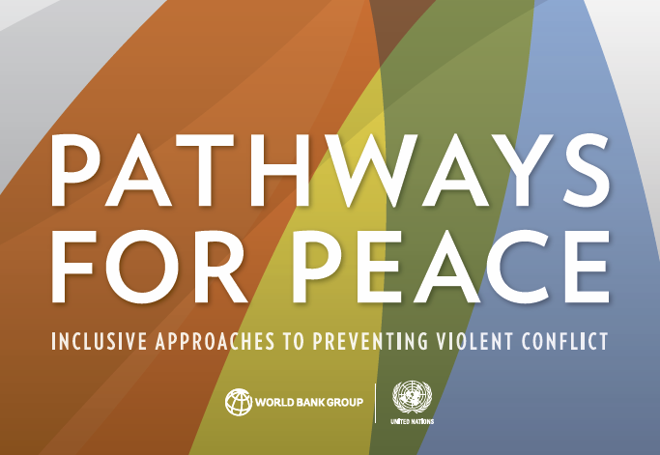
- Coffee and a morning snack will be served from 08:45
Please be invited to a report launch co-hosted by the UNDP Oslo Governance Center and PRIO.
In response to direct request from the UN Security Council, the UN and the World Bank has just issued a first ever joint report on how to prevent conflict and sustain peace: 'Pathways for Peace'. The report will be launched by the lead authors at PRIO on Friday March 16.
Programme
- 08.45-09.15: Coffee
- 09.15-09.30: Welcome by OGC Director Sarah Lister and PRIO Director Henrik Urdal
- 09.30-09.45: Introductory remarks by State Secretary for International Development Jens Frølich Holte
- 09.45-10.15: Presentation of report by Alexandre Marc (WB) and Jago Salmon (UN)
- 10.15-10.30: Short break
- 10.30-11.30: Panel discussion with Q&A from audience
PANEL
- Alexandre Marc (WB)
- Jago Salmon (UN)
- Torunn Lise Tryggestad (PRIO)
- Scott Gates (UiO)
- Benedicte Bull (UiO)
- Facilitated by Sarah Lister (UNDP)
About the study
The Pathways for Peace study originated from the conviction that the international community’s attention must be urgently refocused on prevention.
While the United Nations and the World Bank Group are governed by different yet complementary mandates, they share a commitment to preventing conflict, as expressed in the 2030 Agenda for Sustainable Development, the UN General Assembly and Security Council Resolutions on Sustaining Peace, and the 18th replenishment of the World Bank Group’s International Development Association (IDA).
The study’s objective is to improve the way in which domestic development processes interact with security, diplomatic, justice, and human rights efforts to prevent conflicts from becoming violent.
The study stresses the importance of exclusion-related grievances that are at the root of many violent conflicts today; it particularly focuses on grievances related to access to power, natural resources, security, and justice. While societies have a shared responsibility to ensure that conflict does not become violent, governments and states are particularly accountable in this area. However, in addressing the multiple global risk factors that drive violent conflict today, governments are often one actor among many.





